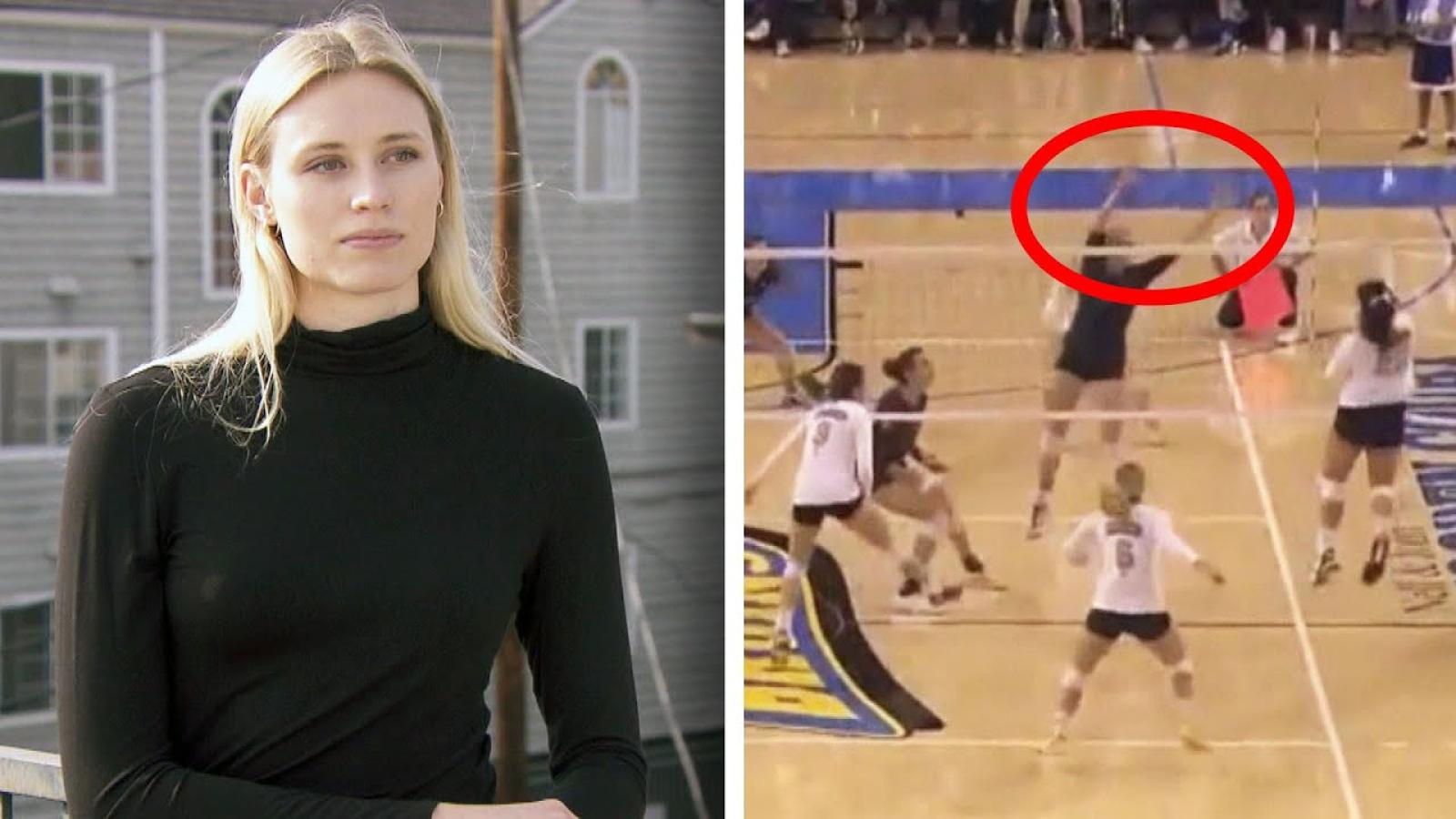Sports medicine doctors support female athletes, state bans on males in girls' sports at SCOTUS
Physiology of sex regardless of hormone interventions makes it practically impossible for females to match males, and nature of athletic injuries particularly threatens females, physicians say. Human rights advocates support females.
The physiology of sex and the nature of injuries from athletic competition counsel against letting males compete in female sports, American and foreign practitioners of sports medicine told the U.S. Supreme Court as it evaluates the constitutionality of Idaho's ban on males in female competition, blocked by an appeals court as an equal-protection infringement.
More than 40 friend-of-the-court briefs flooded the high court last week in support of Idaho, including nearly 50 members of Congress, 26 states led by Arkansas and Alabama, more than 200 female legislators nationwide, the Justice Department, U.S. Catholic bishops and Latter-day Saints, Southern Baptist, Jewish and other religious groups.
William Bock, the lead attorney for the U.S. Anti-Doping Agency's investigation of Lance Armstrong's U.S. Postal Service Cycling Team and for challengers to the lax regulatory scheme for chemical abortion, filed three briefs on behalf of collections of female athletes.
Former University of Kentucky swimmer Riley Gaines leads one focused on how sex differences "naturally increase the anxiety and insecurity of women and elevate their personal safety risks" when males enter their locker rooms. Bock's other briefs are for the Independent Council on Women's Sports and International Consortium on Female Sport.
Foreign advocates are also concerned, with United Nations Special Rapporteur on Violence Against Women and Girls Reem Alsalem saying that protecting female-only competition is consistent with U.S. commitments under international human rights law.
"Because the erosion of female-only sports, as well as related spaces, has been shown to exacerbate the vulnerability of women and girls to human rights violations and abuses, any retrogression of women’s and girls’ sex-based protections must not be permitted in both law and practice," Alsalem wrote.
U.K. human rights charity Sex Matters, which played a leading role in the U.K. Supreme Court defining "women" by biology in the Equality Act, said the case affects "thousands of British women each year" who come to the U.S. on student visas to "play sports on collegiate teams covered by legal protections such as Title IX."
The parties pulled SCOTUS in opposite directions following its Skrmetti decision upholding Tennessee's ban on medicalized gender transitions for minors, which declined to recognize transgender identity as a protected class.
Idaho quickly told the court that Skrmetti didn't resolve the question of laws "indisputably based on sex" like Idaho's HB 500 or the circuit split on whether sex is "biologically based" or "perception based" in equal-protection cases.
Lindsay Hecox, a male athlete who identifies as a woman and convinced the 9th U.S. Circuit Court of Appeals to block Idaho's law as applied to Hecox, told SCOTUS two months after it accepted Idaho's appeal that it no longer had jurisdiction and hence could not issue a definitive ruling on laws like Idaho's.
Represented by the ACLU, Hecox voluntarily dismissed the lawsuit Sept. 2 and told SCOTUS later that day the case was "moot because she has no live claim against petitioners." Idaho has until Friday to respond to Hecox's "suggestion of mootness."
Hecox decided to "cease playing women’s sports in any context covered by H.B. 500" and dismissed the suit with prejudice so it can't be filed again, citing the fear that "I will personally be subjected to harassment that will negatively impact my mental health, my safety, and my ability to graduate as soon as possible" if Hecox continues the case.
Males bring 'more energy and force to a collision than women and girls'
Several doctors of sports medicine, including four past presidents of the American Medical Society for Sports Medicine and team physicians for the WNBA's Mystics and NHL's Stars, told the court that male advantage starts before puberty and the immutable differences between the sexes have "significant implications for athlete safety."
Studies show males are "taller, have bigger, denser, stronger, and longer bones, and can throw faster and kick harder than women," and that "no amount of testosterone suppression will eliminate" these advantages, the brief says.
Males bring "more energy and force to a collision than women and girls," increasing the risk of injury for females, who are "already more susceptible to sports-related injuries."
American and South African sports physiologists said the most famous names in women's sports, including the Williams sisters in tennis, soccer's Megan Rapinoe and Olympic swimming's Katie Ledecky, "likely would never have attained championship status" without a protected women's category.
They mocked the 9th Circuit as scientifically ignorant by treating sex as a "mere oversimplification," when in fact men "outperform equally aged, talented, and trained women in virtually all athletic events … from youth sports to elite competition," with an advantage "often so large as to be insurmountable" for comparable females.
The observed 10-13% male speed advantage is "immense" in light of the 2024 men's Summer Olympics, in which "an advantage of roughly 4% would have bumped an individual American male runner from not even qualifying for the 100-meter event to winning the gold medal."
Trans athlete's expert witness spread misinformation?
European sports physiologists and American Lara Carlson, former president of the New England American College of Sports Medicine, jointly told SCOTUS that "male advantages sometimes synergize" as in punching strength, where "no single variable" such as arm length or muscle mass creates the 162% "magnitude of difference" between the sexes.
"Transient increases in sex hormones during infancy (so-called 'minipuberty')" correlate with prepubertal male advantages of 1-10% in swimming, track and jumping, and the male testosterone surge between ages 11-14 is "almost perfectly correlated" with the performance gap between the sexes for swimming, the brief says.
Yet testosterone suppression, sometimes required as a condition of male participation in female sports, barely reduces the male advantage, the physiologists said. There's no mechanism by which it could "reduce height or skeletal measurements," and a dozen "controlled longitudinal studies" show a 5% loss of muscle mass or strength after a year.
Filing in support of neither party, "world renowned biomedical researchers" from the University of Michigan, Mayo Clinic and other institutions seek to ensure "the record contains clear and correct information" on biological sex, male advantage and the "nature and extent of the mitigating effects" of puberty blockers and cross-sex hormones on that advantage.
They alleged an expert witness for Hecox falsely claimed "bone shrinks along with muscle when testosterone is suppressed in transgender women and girls." Though "bone mineral density "may decline slightly … morphological bone development – i.e. long bone diameter and length which determines limb length and height – is irreversible," the brief says.
"A far less talented and skilled male will soundly beat a female" in coed competition, which "solidifies and reinforces that [females] are not worthy of equal opportunity and recognition," says a brief by 31 Olympians, women's tennis legend Martina Navratilova and others.
"There is enormous emotional trauma that accompanies women and girls" forced to compete against males, they said, sharing several stories of female athletes including fencer Stephanie Turner, who got kicked out USA Fencing women's competition for taking a knee against a male competitor and testified at a congressional hearing on "unfair play."
Natural versus 'gerrymandered' philosophical categories
Two dozen philosophers including Princeton's Robert George, perhaps the best-known social conservative in American academia, explained to SCOTUS the "general philosophical distinction" between "natural and gerrymandered categories," which is "implicitly relied on by sports regulators virtually all the time."
Because both sides in the case "officially recognize that it is justified to organize sports approximately around the sex categories," it's justifiable to organize around sex "exactly," their brief said. Hecox's side seems to advocate "reorganizing sports around the vividly unnatural boundary" between males who don't identify as female and all others.
University of Texas sociologist Mark Regnerus, whose 2012 study of same-sex parenting got him investigated for "scientific misconduct" yet whose findings were validated as "robust" in a scholarly book this year, also argued gender identity is too vague to replace sex.
"If key scholars did not widely dispute its essential nature, and if medical associations did not privilege the cognitive aspects of gender identity almost exclusively over its physical (i.e., biological and hormonal) aspects, they would not be in such an impotent position to counsel here," Regnerus's brief said.
The Facts Inside Our Reporter's Notebook
Videos
Links
- More than 40 friend-of-the-court briefs
- nearly 50 members of Congress
- 26 states led by
- more than 200 female legislators
- Justice Department
- U.S. Catholic bishops
- Latter-day Saints, Southern Baptist, Jewish
- lead attorney for the U.S. Anti-Doping Agency's investigation
- challengers to the lax regulatory scheme for chemical abortion
- Riley Gaines
- Independent Council on Women's Sports
- International Consortium on Female Sport
- Reem Alsalem saying that protecting female-only competition
- U.K. human rights charity Sex Matters
- Skrmetti decision upholding Tennessee's ban
- Idaho quickly told the court
- 9th U.S. Circuit Court of Appeals to block Idaho's law
- it accepted Idaho's appeal
- Hecox voluntarily dismissed the lawsuit Sept. 2
- the case was "moot because she has no live claim
- Idaho has until Friday
- Several doctors of sports medicine
- American and South African sports physiologists
- European sports physiologists
- American Lara Carlson
- "world renowned biomedical researchers"
- 31 Olympians, women's tennis legend Martina Navratilova
- taking a knee against a male competitor
- testified at a congressional hearing
- Two dozen philosophers including Princeton's Robert George
- 2012 study of same-sex parenting
- investigated for "scientific misconduct"
- validated as "robust" in a scholarly book
- Regnerus's brief said
Other Media
Image

Former North Carolina volleyball player Payton McNabb was seriously injured by a male volleyball player spiking the ball in her face.
Inside Edition/YouTube














